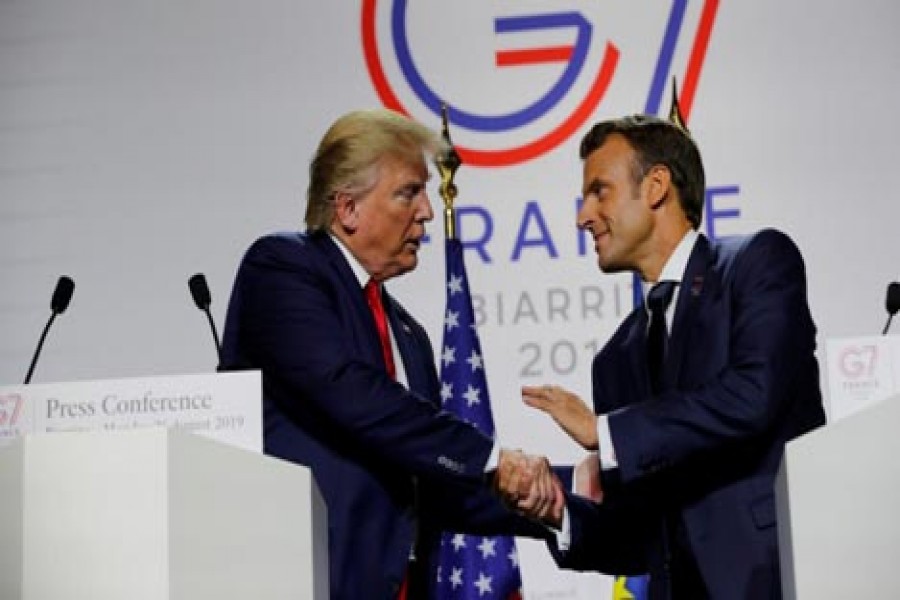As of now two opposing coalitions in the Middle East define the rivalry that in fact threatens to tear down the Middle East apart. As competition for dominance increased over the last one decade between Iran's network of state and non-state, including Hezbollah of Lebanon and a coalition of Saudi Arabia, United Arab Emirate (UAE) and other Gulf countries except Qatar turned out to be Middle East battle ground.
In mid-February this year in Warsaw Israeli Prime Minister Benjamin Netanyahu met foreign ministers of Saudi Arabia, United Arab Emirates and two other Gulf countries to contain Iranian influence in the Middle East. None of them has accorded formal recognition to the State of Israel. President Trump expedited this trend on his first trip as President to Riyadh of Saudi Arabia followed by Tel Aviv of Israel.
The present scenario is nothing. The rivalry between Saudi Arabia and Iran has been played out through a series of proxy wars, including Syria, Bahrain and Yemen.
UAE is a member of Saudi-led military coalition that has been pounding Yemen for over four years. Of late, a good sense has been prevailed on President Khalifa bin Zayed Al Nahyan of UAE who realised that the war in Yemen is isolating them from friendly members of the Congress in the United States. That has reflected in an op-ed by Foreign Minister of UA in the Washington Post recently which confirmed reports that "the country was drawing down its presence in Yemen in order to double down on the political process". That trend has been reflected through the signing of a Memorandum of Understanding (MoU) between the UAE and the Islamic Republic of Iran on July 25 this year which aims at improving border security. UAE delegation, led by Brigadier General Mohammed Ali Musleh, arrived at Tehran to attend the sixth meeting of coast guards across the Strait of Hormuz through which more than one-third of the world's seaborne oil tanker passes.
In the aftermath of the seizure of a foreign oil tanker by the Revolutionary Guard forces of Iran in the strait of Hormuz, President Trump dispatched 500 US soldiers to Saudi Arabia to protect the Kingdom. Trump administration decided to dispatch US troops following talks with Saudi Prince Mohammed Bin Salman at G-20 summit in Japan on June 29. The US sent troops to Saudi Arabia after a gap of 16 years. To discuss the emerging situation in the region, Iraqi Prime Minister Adel Abdullah Mahdi met President Hassan Rouhani of Iran
Meanwhile, Omani foreign Minister Yusuf bin Alawi bin Abdullah paid a visit to Tehran to have a dialogue with Iranian foreign minister Mohammad Javad Zarif on the situation in the Gulf. Though a member of the Gulf Cooperation Council, Oman has been maintaining diplomatic relations with Iran. Oman's intermediary role facilitated the process of signing of the Iran nuclear deal with five members of the UN Security Council plus Germany. (Trump administration however withdrew from the nuclear deal in May 2008.)
Meanwhile, US's efforts to build up a coalition to protect oil shipping lanes in the Strait of Hormuz have faced with opposition from Australia and Germany while France and Britain committed to coordinate and share information in the Gulf to reinforce maritime security but without deploying additional assets. But Israel joined with the United States to protect oil shipping lines amidst criticism from Iran.
Strait of Hormuz is a narrow waterway which connects the Persian Gulf to the Gulf of Oman and shipping lanes are hardly two nautical miles wide. The vessels carrying oil pass through the territorial waters of both Oman and Iran.
President Trump's erratic behaviour in dealing with Iran has caused confusion in the world. He urged Tehran in June this year to come to the table while giving warning of impending military action over a drone's downing by Iran. Recently, he invited Iranian foreign minister Javad Zarif to have talks with him but the United States imposed sanctions against the property of Iranian foreign minister. In his response Iranian Foreign Minister said on August 05 sanctions imposed on him show "Washington's failure to find a diplomatic solution to ease tense situation in Persian Gulf".
Iranian President Hassan Rouhani has however spoken on August 06 in favour of talks with the United States provided US administration withdrew sanctions against Iran.
At G-7 Summit (August 24-26), French President Emmanuel Macron helped de-escalate the tension between the US and Iran. The Iranian Foreign Minister was present in France during G-7 Summit at the invitation of France and this offered him an opportunity to exchange views on the nuclear agreement with leaders of the European Union (EU). The French President kept Trump informed about the presence of the Iranian Foreign Minister in France in case the US President was interested to talk to him. No such meeting took place but President Trump eventually toned down his tirade against Iran and announced he was open to meeting the Iranian President under right circumstances. It is possible the two presidents will meet during the UN general assembly session later this month.
Time will say which way the wind blows in resolving the problem between the USA and Iran. Prime Minister Netanyahu of Israel, a close friend of President Trump, is playing dangerous games behind the scene. But the departure of Trump's hawkish national security adviser John Bolton, who was against any improvement of relations with Iran, might help repair relations between US and Iran.
Mohammad Amjad Hossain, retired diplomat from Bangladesh and former President of Nova Toastmaster International club of USA, writes from Virginia, USA


